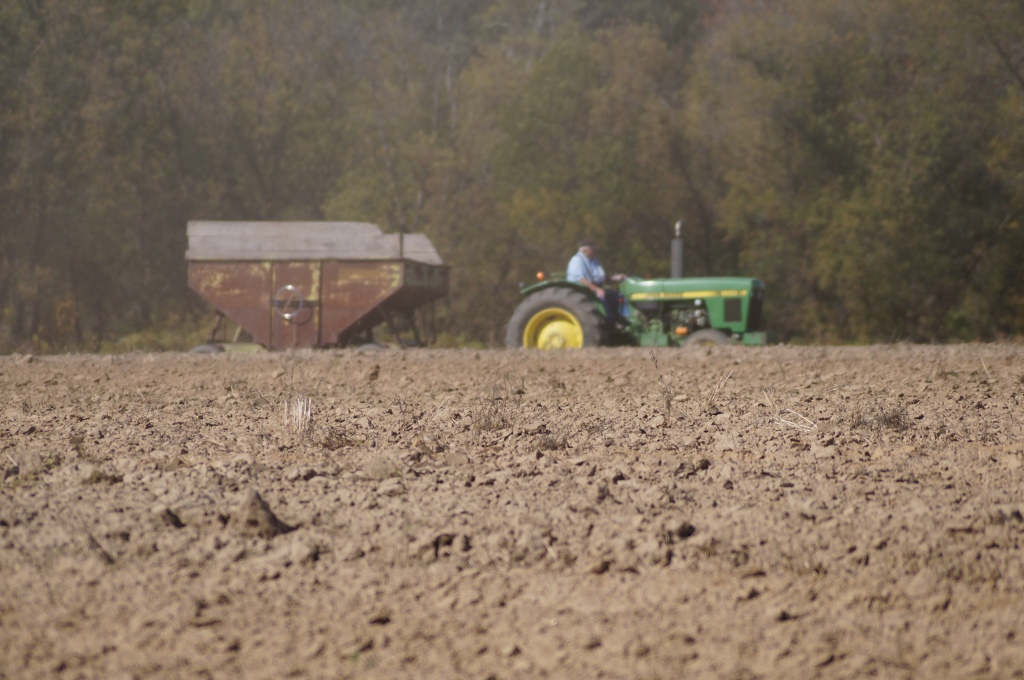Gratitude Day 489
Mon., July 20, 2020
John 12:24 – Let me make this clear: A single grain of wheat will never be more than a single grain of wheat unless it drops into the ground and dies. Because then it sprouts and produces a great harvest of wheat—all because one grain died.
Recently, Hubby Rick and I were driving through the countryside. As normal, Rick is scouting the crops. Is corn tasseling? Are there water puddles in the fields? How close is the wheat to harvesting?

It’s the last one – wheat harvesting – that brings back a variety of memories in this last half of July. Rick’s Dad, Tony, loved to grow winter wheat. In the years that I knew Tony, getting the wheat harvested was always a busy and slightly stressful wheat for the Vielhubers.
Truth? It was more than just one week that occupied lots of chatter about wheat harvest. It began in the fall when the wheat was planted. In the spring, maybe the wheat would need spraying or fertilizer. As the heads began to turn golden, Tony began calling the local co-op, daily, inquiring what the local price was for a bushel of wheat. I’m sure the folks at the co-op would look at their caller id and know exactly why Tony was calling.
The decision about when to harvest includes more than just the price. Another important factor is the test weight of the wheat. This is influenced by how much water the wheat plant is retaining. There’s a magic test weight window, in which the wheat isn’t too weight or too dry. This often becomes the deciding factor of just when wheat is harvested.
The last number of years, Tony’s grandson, Andy combined the wheat. Rick would get the wagons lined up to offload the wheat from the combine. Rick and Tony drove the wagons down to the co-op where it would be determined how many bushels of wheat there were as well as the test weight. After the wheat grains were harvest, the combine left the shafts or steams of the wheat in the field. These would be baled into straw, which was sold and used for bedding for animals.
The last number of years Tony grew wheat, Rick found himself handling more of the responsibilities involved in harvesting; all in between his work shifts. He would work all night, get a couple of hours of sleep in the early morning, only to be awoken by Tony because the combine was hitting the field and someone would need to drive the wagons the couple miles to town to the co-op. Tony would drive some of the wagons. But as he neared 90-years-old, how often he drove the wagons behind his little John Deere tractor became a concern.

Then, there was getting the neighbor to bale the straw into large round bales and get the bales delivered to whomever purchased them. If Tony’s decades old truck wasn’t working quite right, Rick would line-up someone else to haul the straw and that it would be safely delivered. Every year, it seemed there would be a few hick-ups along the way, as is often the situation with field work. Every year, Rick would confide and say, “This is the last year Dad is going to raise wheat,” knowing that when fall came, it would be so very difficult for Rick to not fill the drill with wheat seed and make sure it got planted. Come fall, the wheat that Tony held back for next year’s seed would find its way into the ground so it would grow into next year’s wheat crop.

One grain of wheat in a bag in the shed really isn’t extremely helpful. Basically, the seed dies when it is harvested, and it stops growing. But when the seed is put back into the ground and is watered, it begins to grow once again. The seed sprouts little leaves when creep out of the ground and the whole process of growing new plants repeats once again.
Our faith, Jesus says, is a lot like this wheat seed. Faith can become stale. Nonresponsive. Dead. Just like the wheat seed, it needs some water, encouragement, heat, and light for little leaves to sprout back to life. Sometimes the dead seed stays like this for a while; just like seed stuck in the shed. Until WE decide to take some steps to bring it back to life, it can and will remain dormant.
When our seed of faith goes dormant, we often blame God. “Where are You?” we plead with God. “You didn’t answer my prayer the way I wanted … so I’m going to pout.” Or “Why do I have to do all the work or wait for You? Can’t you see I’m on a timetable?” we plead.
But then again, God’s timetable is not our timetable. Maybe our prayer was answered … and we didn’t like the answer. So instead of acknowledging it, we simply ignore it. Quite honestly, when we don’t feel close to God, it’s not God that did the moving. We did.

If you feel your faith is parched, dry and on the verge of dying, check yourself. Have you been watering your spiritual soul with regular doses of prayer? Are you finding opportunities to worship God in some small way every day? Are you looking for God in consistent scripture reading?
Are you depending only upon your own ideas and wisdom, assuming you know better than God?
Honestly, it’s really OK when our seed souls feel far from God. I find that often, best growth happens when I haven’t felt awfully close to God. Even in the near-death times of our seeds of faith, I pray we don’t give up on God. Be disappointed. Be hurt. Be angry. But please, don’t turn completely way. Instead, find a new or consistent way to keep even a little bit of nourishment going towards your seed of faith. And as you journey through this time of disappointment, keep looking for God. You might be amazed at what happens.
For the lesson from wheat near harvest, I am grateful.
Blessings –
Dianne
Dear God – as we see so many wheat fields a beautiful golden brown, may we recall Jesus’ words about keeping ourselves close to God. Even if our faith is feeling a little tired and distracted, may we keep searching for You. Amen.
If you have enjoyed this blog, please pass it along to someone else who will also enjoy it.


Comments are closed